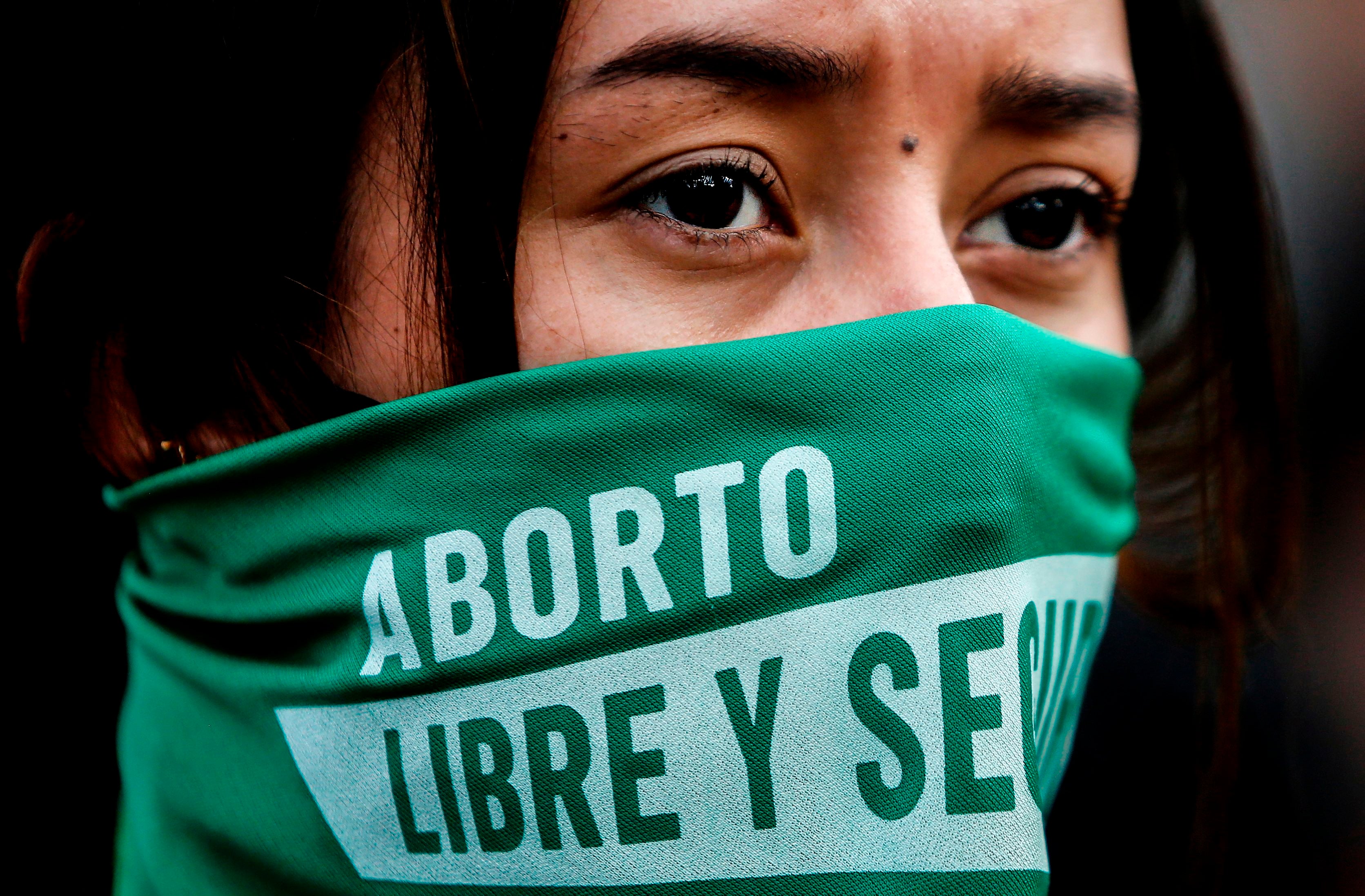‘Saving millions of lives’: Abortion could be decriminalised in Colombia in next month
‘Many women in Colombia are forced to have their rapist’s baby,’ says lawyer

Abortion could be decriminalised in Colombia in the next month as landmark decisions to legalise pregnancy terminations in Latin America have a “ripple effect” across the region, campaigners said.
Colombia decriminalised pregnancy terminations for women whose life or health is at risk, or in cases where there are fatal foetal abnormalities, or if the pregnancy is the by-product of rape or incest, back in 2006.
But campaigners told The Independent women are still routinely blocked from having an abortion in these circumstances.
Catalina Calderon, director of advocacy at the Women’s Equality Centre, told The Independent there are currently two planned discussions for the Colombian Constitutional Court which call for abortion to stop being deemed a criminal act.
“As it is discriminatory against the girls and women in Colombia,” she added. “The first process has a deadline for the decision on 19 November, and the second on 20 January 2022. That said, if the constitutional court makes a decision to decriminalise abortion on these dates, we may have abortion legalised within the next two weeks.”
Nevertheless, the current situation sees women in Colombia imprisoned simply for having an abortion while those who have fallen pregnant after being raped are forced to continue with their pregnancy.
A study by Mesa Para la Vida y Salud de las Mujeres, an NGO, found at least 400 women and girls in Colombia are criminalised for getting abortions each year.
Meanwhile, the Guttmacher Institute, a leading abortion rights organisation, discovered less than one per cent of the estimated 400,000 abortions carried out each year in Colombia are performed legally.
Ms Calderon said: “In all other cases, women are still being forced into clandestinity. In Colombia, while there are abortion exceptions, the reality is these exceptions aren’t guaranteeing access to women even when they qualify for a legal abortion.”
Ms Calderon added that her organisation’s on-the-ground work sees how the current rules “cause confusion, bureaucracy, and stigma”, which serve as “barriers for women who are forced to ‘prove’ over and over that they fit within the legal framework, often even needing to resort to legal injunctions and lawsuits to demand their right”.
She explained the obstacles to obtaining an abortion result in rich women being able to have abortions, while impoverished or vulnerable women are blocked.
“And end up facing the choice of continuing an unwanted pregnancy or resorting to unsafe, clandestine procedures,” Ms Calderon added.
She warned backstreet abortions ultimately place “their health and lives at great risk” – claiming that “fully legalising abortion means saving millions of lives by prioritising the health and lives of women in Colombia”.
It is difficult to get figures on the proportion of women who die in Colombia each year from clandestine abortions given the procedures are happening in secretive circumstances. However, the Ministry of Health estimates around 132,000 women go on to experience complications from unsafe abortion in Colombia each year, while roughly 70 women die every year.
Ms Calderon attributed moves to make abortion legal in Colombia to the recent milestone abortion decisions in Argentina and Mexico in the last year – saying the region has witnessed a “monumental shift”.
“The landmark decisions in Argentina and Mexico to decriminalise abortion have had a ripple effect throughout the region,” Ms Calderon added. “There is no bigger proof of this influence than the green handkerchief, the symbol of Argentina’s pro-abortion movement, that has become the region’s symbol, appearing as the landmark symbol of every feminist demonstration in cities across the subcontinent.”
Argentina became the first major Latin American country to legalise abortion at the end of December, while Mexico’s Supreme Court last month ruled that criminal penalties for having a pregnancy terminated are unconstitutional.
Colombia “may soon follow” as one of the biggest and “most influential” countries in the region to overhaul abortion laws, Ms Calderon added.
She hailed the work of Causa Justa, which translates as “Just Cause”, a collective of organisations and healthcare providers, which campaigns for abortion to be decriminalised in Colombia.
The study by La Mesa por la Vida y la Salud de las Mujeres found more than 70 per cent of women prosecuted for abortion were reported by a health professional. Meanwhile, 97 per cent of women prosecuted for getting an abortion were from the rural areas, and 30 per cent were victims of violence, including sexual violence.
Ximena Casas, of Human Rights Watch, told The Independent the constitutional court has a “historic unique opportunity” as they did back in 2006 when exceptions for abortion were introduced.
The court has the chance to ensure abortion is treated as a health issue rather than a criminal issue, the Colombian human rights lawyer said.
Ms Casas, who lives in the Spanish capital of Madrid, noted between 1 per cent and 9 per cent of abortions are conducted in the public health sector in Colombia.
She said: “The rest is private. Doctors can go to prison for providing an abortion. Women should not go to prison for exercising their reproductive rights.
“Many women in Colombia are forced to have their rapist’s baby. There is a lot of stigma around abortion. We are a religious country where talking about sex and reproduction is very limited.”
Ms Casas attributed anti-abortion laws and attitudes to the stigma that surrounds motherhood in Colombia – adding women should not be punished for not wanting children or feeling unable to continue with a pregnancy at that moment in their lives.
Join our commenting forum
Join thought-provoking conversations, follow other Independent readers and see their replies
Comments




Bookmark popover
Removed from bookmarks